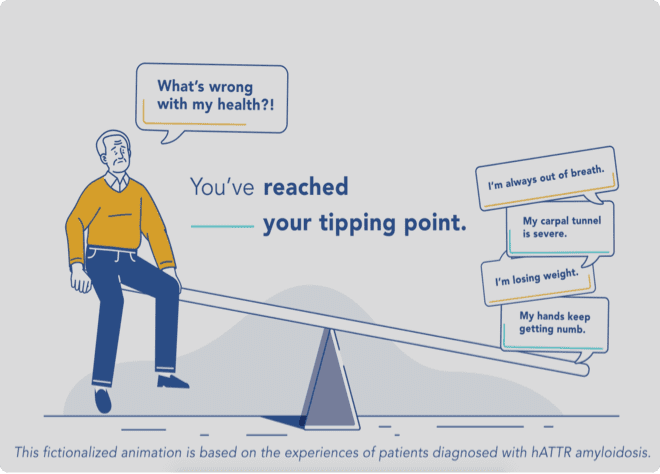Video library
Dr. Champion's Tipping Point: A Doctor's Perspective
Transcript
Moderator: Meet Dr. Hunter Champion, a physician who manages patients with hATTR amyloidosis.
Dr. Champion: As a doctor, one of my biggest challenges is helping patients find out what is causing their symptoms so we can work together to develop a plan to help manage them. Patients may be experiencing multiple symptoms that seem unrelated, and if they are seeing other specialists, I may only be hearing part of their story. As I learn more about their different symptoms, their family history and other specialists they have visited, that's when the pieces start coming together leading me to suspect hATTR amyloidosis and further evaluate them for an accurate diagnosis. These are tipping point moments for me. hATTR amyloidosis is not always easy to diagnose. The symptoms can be mistaken for a number of other conditions. It’s a hereditary multi-symptom disease that shows up in various ways affecting people differently — even related family members. I, along with other specialists, may perform a variety of tests. They can include tests of the heart like electrocardiograms and echocardiograms, or tests of the nervous system like an electromyogram. Also, a genetic test can be conducted to help confirm a diagnosis. Once a patient tests positive and has a clear diagnosis, they now have an answer. We can then create a plan to manage the condition together and move forward. As a doctor, it’s important to look beyond a single symptom and to keep probing. And for patients, it’s important to be your own advocate and to share all of the symptoms you’re experiencing with your healthcare team. If you suspect hATTR amyloidosis, ask your doctor about getting tested, and since it's hereditary, talk to other family members, too. The sooner you get tested, the sooner you and your doctor can plan next steps.
Moderator: Learn more about hATTR amyloidosis at The Bridge.


